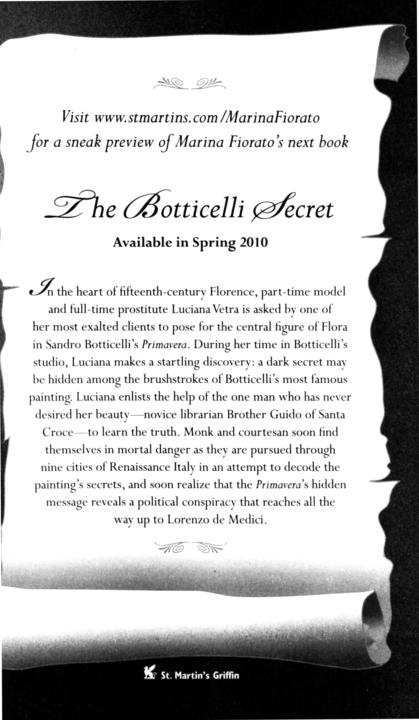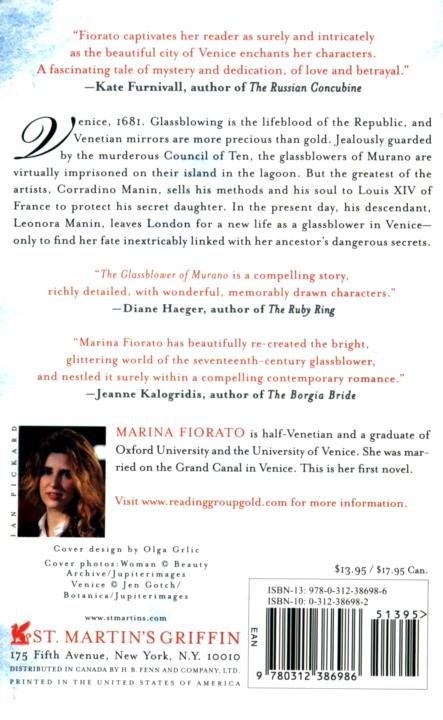The Glassblower of Murano (34 page)
Read The Glassblower of Murano Online
Authors: Marina Fiorato
Through a Glass, Darkly
by Donna Leon
Donna Leon knows Venice so well that every
detail places you in the city. I'm a big fan of
her Guido Brunetti detective novels, but this
is my favorite; a great tale of murder set in the
glass factories of Murano.
Death in Venice
by Thomas Mann
Another wonderful portrait of Venice, this time seen
from the Lido (where I used to live). In this novella
the city is sick; death stalks Venice in the shape of a
mysterious disease, in a marked contrast to the
youthful perfection of the Adonis of the
Hotel des Bains.
The Merchant of Venice
by William Shakespeare
Not a novel, I know, but a wonderful play and a
direct influence on my book. The Merchant of Venice,
as the name suggests, is proof positive that trade was
the lifeblood of the city in Shakespeare's day.
Interesting too, that every section of society engaged
in trade, even the nobility; in other Renaissance kingdoms, nobles thought trade was a dirty word.

Reading Group Questions
1. Glass and Venice are both metaphors for change in
the novel. How do they mirror the changing reflections of the characters? In particular, discuss this
facet of the novel in relation to the roles of Leonora
and Corradino.
2. Marina Fiorato uses imagery of glass: its beauty yet
changeability; its strength yet fragility, throughout her
novel. How does this portray an unfamiliar, dark, and
sinister side to the most romantic European city?
3. Do you think Corradino Manin did the right thing
by his "betrayal"?
4. Discuss the narrative structure of The Glassblower of
Murano. In what ways do the two intertwined
strands of the novel, the story set in the Renaissance
and Leonora's modern-day narrative, shape the story?
5. Marina Fiorato says in her acknowledgments that
having a child is like letting your heart walk around
outside your body. Discuss the various relationships
between parent and child in the story. How do they
vary, and in what ways are they similar? What do you
think is signified by Leonora's gift of the glass heart
pendant to her child?
6. How important was it for Leonora to leave everything behind and move to Venice, and what do her
discoveries teach her about family?
7. Think about the male-dominated fornace on Murano.
Leonora has an uncertain relationship with the
maestros in the factory because she is a woman in
what remains a man's world. How do you think this
relationship affects her view of her own femininity?
8. Is it acceptable-because of the importance of
glassblowing to Venetian heritage-for Leonora to be
treated as an outsider by the maestros?

9. The story of The Glassblower of Murano is centered
around Corradino's secret and Leonora's search for
the truth. Discuss the various elements of mystery
in these pages. What types of narrative devices does
Marina Fiorato use to keep the reader guessing?
10. Few places are as romanticized, celebrated, and
praised as Venice. Have you traveled to Venice? If
so, do you agree with the portrayal of Venice in the
story? If not, how did reading this book confirm or
deny your preconceived notions of one of the
world's most famous places?


